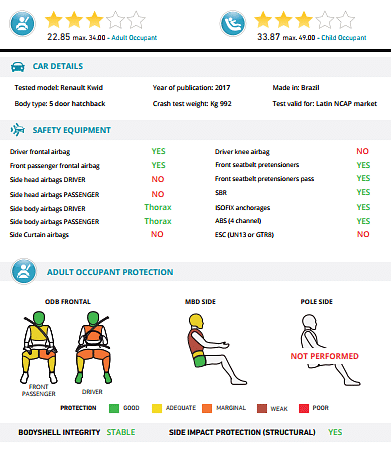Brazilian-made Renault Kwid gets three-star Latin NCAP rating
The Renault Kwid, produced in Brazil, gets three stars for adult occupant protection and three stars for child occupant protection.
Latin NCAP (New Car Assessment Programme) has released its seventh round of results for 2017. It includes an improved performance by the Renault Kwid hatchback. In the safety watchdog’s latest round of testing, the Kwid, made in Brazil for the Latin American market and equipped with four airbags, showed clear improvements in safety offering better protection performance, and other market competitors, even under more stringent Latin NCAP protocols.
In September 2016, the made-in-India Kwid, was awarded a one-star Global NCAP crash test rating after the company applied a series of improvements since it was initially tested (in May 2016) when it scored a zero-star rating.

The Renault Kwid, produced in Brazil, achieved three stars for adult occupant protection and three stars for child occupant protection. The model that reached top selling positions after its recent launch, was tested in front and side crash configurations. The Kwid showed an adequate frontal protection and marginal side impact protection with weak protection to the chest of the adult but enough to reach a solid three stars in adult occupant protection. The Kwid side impact structure prevented massive intrusion of the side impact barrier which combined with the side thorax airbag could keep the adult injuries below the high probability of life threatening injuries limit.
The child occupants showed adequate and good protection during the front and side crash tests thanks to the CRS that was installed using the ISOFIX and Top Tether anchorages. The Kwid offers standard ISOFIX anchorages, however its lack of airbag disconnection switch in the passenger frontal airbag in case a rearward facing CRS needs to be installed, and lack of 3-point belts in all seating positions which explains its child occupant protection rating.
The Kwid for Brazil showed extra structural reinforcements and better safety performance compared to the Indian version tested by Global NCAP last year.
Commenting on the test result, Alejandro Furas, secretary general of Latin NCAP, said: “It is good to see how fast manufacturers can react from the first-ever tested Kwid (Indian version tested by Global NCAP) to this three-star Brazilian-made Kwid. It is encouraging to see car makers reacting to Latin NCAP’s, Global NCAP’s and consumers’ preferences for better safety performance, even in entry level cars. The market is reacting earlier and beyond governmental requirements. Latin NCAP is calling for all governments in Latin America to urgently adopt both the UN’s front and side impact crash test standards certification, electronic stability control (ESC) and pedestrian protection requirements. In the meantime to make Latin NCAP tests mandatory for all cars in the market, which will allow all consumers to have clear information on the safety offered by the car that they plan to buy.”
Ricardo Morales Rubio, Latin NCAP Chairman of the Board of Directors, said: “This result is another clear example of the strength of consumers’ voice. We praise Renault for making decisions to bring better safety earlier and beyond governmental regulations for Latin America & the Caribbean region. This result demonstrates that consumers are taking into consideration the safety levels of cars when buying a new unit. We will continue pushing governments in order to make safety mandatory, to offer consumers full and independent information of the safety offered to all cars in the market.”
RELATED ARTICLES
Autoliv Plans JV for Advanced Safety Electronics With China’s HSAE
The new joint venture, which is to be located strategically near Shanghai and close to several existing Autoliv sites in...
JLR to Restart Production Over a Month After September Hacking
Manufacturing operations at the Tata Group-owned British luxury car and SUV manufacturer were shut down following a cybe...
BYD UK Sales Jump 880% in September to 11,271 units
Sales record sets the UK apart as the largest international market for BYD outside of China for the first time. The Seal...






 By Autocar Professional Bureau
By Autocar Professional Bureau
 17 Nov 2017
17 Nov 2017
 11015 Views
11015 Views




















 Ajit Dalvi
Ajit Dalvi




